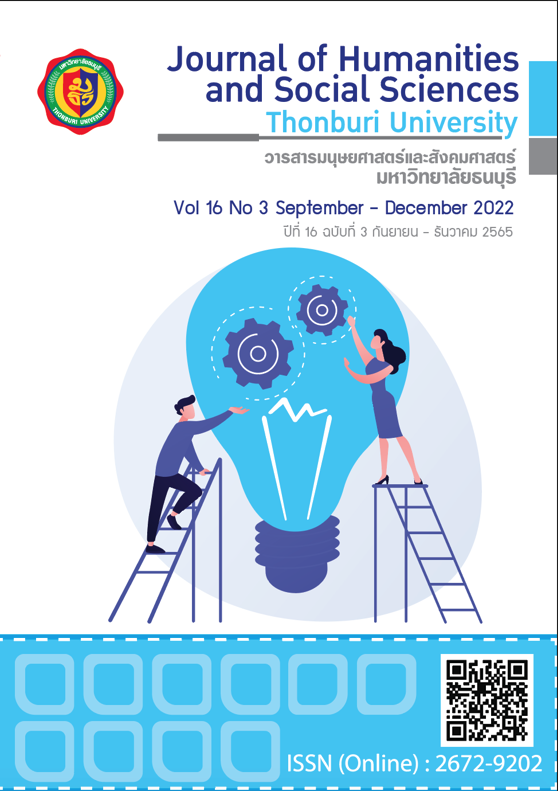The Structural Relationship Model of Organizational Capability and Corporate Social Responsibility Affecting the Sustainability of the Certified Green Industry in Thailand
Keywords:
OOrganizational Capability, Corporate Social Responsibility, Sustainability, Certified Green Industry in ThailandAbstract
The objective of this research was to study the structural relationship of organizational abilities. and social responsibility affecting the sustainability of the green industry is guaranteed in Thailand. The researcher collected data from 3,387 factory operators who received certificates from level 1 to 5 in 9 green industries related to agricultural products, plants, vegetables, food, seasonings or food preparations, tea and coffee, amounting to 3,387 factories. There were sample sizes of 438 factories. The research instruments were questionnaires and the statistics used were mean, standard deviation. The analysis of the data by using the structural analysis of the relationship between the variables. The results showed that the model was consistent with the empirical data. All values of the straightness test index of the harmonious model were good. The hypothesis test found that organizational capability had a positive direct influence on sustainability with a direct influence = 0.932. It also had a positive indirect influence through corporate social responsibility with a positive indirect influence = 0.392 and a positive total influence = 0.956, and corporate social responsibility with a positive direct influence on sustainability with a positive direct influence = 0.421 and the total influence = 0.421 with a statistically significant level of 0.01 which was consistent with the research hypothesis.
References
กระทรวงอุตสาหกรรม. (2554). อุตสาหกรรมสีเขียว. สืบค้นเมื่อ 1 ธันวาคม 2564, จาก http://www.industry.go.th/chainat/index.php/download/2016-06-03-00-10-23/214-2016-07-06-03-36-25/file
ธนันธร มหาพรประจักษ์. (2563). ฟอรั่มเศรษฐกิจโลกกับการพัฒนาอย่างยั่งยืน. สืบค้นเมื่อ 1 ธันวาคม 2563, จาก https://www.bot.or.th/Thai/ResearchAndPublications/articles/Pages/Article_17Feb2020.aspx
วรวุฒิ ไชยศร , และ บุญสม เกษะประดิษฐ์. (2560). ความรับผิดชอบต่อสังคมขององค์กรธุรกิจกับการพัฒนาที่ยั่งยืน: กรณีศึกษาความรับผิดชอบต่อสังคม 6 บริษัท. วารสารปัญญาภิวัฒน์, 9(3), 140-152.
วิฑูรย์ สิมะโชคดี. (2555). อุตสาหกรรมสีเขียวของไทย. วารสาร TPA News, 16(187), 26.
ศิริรัตน์ ตรงวัฒนาวุฒิ และ ปิยวรรณ สิริประเสริฐศิลป์. (2565ก). ความสามารถขององค์การด้านสิ่งแวดล้อม : แนวคิด นิยามความ สำคัญ และแนวทางการดำเนินงานด้านสิ่งแวดล้อมอย่างยั่งยืนของอุตสาหกรรมสีเขียวที่ได้รับการรับรองในประเทศไทย. วารสารสันติศึกษาปริทรรศน์ มจร, 10(2), 871-885.
ศิริรัตน์ ตรงวัฒนาวุฒิ และ ปิยวรรณ สิริประเสริฐศิลป์. (2565ข). ความสัมพันธ์เชิงโครงสร้างของความสามารถขององค์การ และความรับผิดชอบต่อสังคมที่ส่งผลต่อความยั่งยืนของอุตสาหกรรมสีเขียวที่ได้รับการรับรองในประเทศไทย. วารสารมนุษยศาสตร์และสังคมศาสตร์มหาวิทยาลัยธนบุรี, 16(3).
ศูนย์วิจัยเศรษฐกิจและธุรกิจ ธนาคารไทยพาณิชย์. (2559). จับทิศทางอุตสาหกรรมไทย ปี 2559. ธนาคารไทยพาณิชย์.
Annunziata, E., Pucci, T., Frey, M., & Zanni, L. (2018). The role of organizational capabilities in attaining corporate sustainability practices and economic performance: Evidence from Italian wine industry. Journal of cleaner production, 171, 1300-1311.
Boonchaisuk, P. (2013). Creative industries Driving the Thai economy stronger. Retrieved December 1, 2020, from http://library.dip.go.th/multim6/edoc/2556/22145.pdf
Carroll, A. B. (1979). A three-dimensional conceptual model of corporate performance. Academy of management review, 4(4), 497-505.
Economic Intelligence Center. (2016). Catch the Thai industrial direction in 2016. Bangkok: The Siam Commercial Bank Public Company Limited. (in thai)
Erturgut, R. (2012). The future of supply chain and logistics management in the strategic organizations: contractor companies and new generation suppliers. Procedia-Social and Behavioral Sciences, 46(1), 4221-4225.
Grewatsch, S. ; & Kleindienst, I. (2018). How organizational cognitive frames affect organizational capabilities: The context of corporate sustainability. Long Range Planning, 51(4), 607-624.
Helfat, C. E. & Peteraf, M. A. (2003). The dynamic resource based view: Capability lifecycles. Strategic management journal, 24(10), 997-1010.
Inan, G. G., & Bititci, U. S. (2015). Understanding Organizational Capabilities and Dynamic Capabilities in the Context of Micro Enterprises: A Research Agenda. Procedia - Social and Behavioral Sciences, 210, 310-319.
Samad, S., Aziz, N. N. A., Jaidi, J., & Masoud, Y. A. (2016). Influence of organizational capability on competitive advantage in small and medium enterprises (SMEs). International Business Management, 10(18), 4163-4171.
Santos, M. (2011). CSR in SMEs: strategies, practices, motivations and obstacles. Social Responsibility Journal, 7(3), 490-508.
Schienstock, G. (2009). Organizational Capabilities: Some reflections on the concept. IAREG-Intangible Assets and Regional Economic Growth, 1(2), pp. 39-53.
Shi, J., Huang, W., Han, H., & Xu, C. (2021). Pollution control of wastewater from the coal chemical industry in China: Environmental management policy and technical standards. Renewable and Sustainable Energy Reviews, 143, 110883.
Translated Thai References
Chaisorn, W. & Kesapradist, B. (2017). Corporate Social Responsibility and Sustainable Development :case study of 6 company. Panyapiwat Journal, 9(3), 140-152.
Mahapornprachak, T. (2020). World Economic Forum on Sustainable Development. Retrieved December 13, 2020, https://www.bot.or.th/Thai/ResearchAndPublications/articles/Pages/Article_17Feb2020.aspx (in thai)
Ministry of Industry. (2011). Green Industry. Retrieved December 1, 2020, from http://www.industry.go.th/chainat/index.php/download/2016-06-03-00-10-23/214-2016-07-06-03-36-25/file (in thai)
Simachokedee, W. (2012). Thai green industry. TPA News, 16(187), 26. (in thai)
Trongwattanawuth, S. & Siriprasertsin, P. (2022a). Organizational Capabilities on Environmental: Concepts, Definition and Guideline for Operational of Environment Sustainability of Certified Green Industry in Thailand. The Journal of MCU Peace Studies, 10(2), 871-885. (in thai)
Trongwattanawuth, S. & Siriprasertsin, P. (2022b). The Structural Relationship Model of Organizational Capability and Corporate Social Responsibility Affecting the Sustainability of the Certified Green Industry in Thailand. Journal of Humanities and Social Sciences Thonburi University, 16(3). (in thai)
Downloads
Published
How to Cite
Issue
Section
License
Copyright (c) 2022 ศิริรัตน์ ตรงวัฒนาวุฒิ, ดร.ปิยวรรณ สิริประเสริฐศิลป์

This work is licensed under a Creative Commons Attribution-NonCommercial-NoDerivatives 4.0 International License.
ผลงานที่ปรากฎในวารสารฉบับนี้เป็นลิขสิทธิ์เฉพาะส่วนบุคคลของผู้เขียนซึ่งต้องรับผิดชอบต่อผลทาง กฎหมายที่อาจเกิดขึ้นได้และไม่มีผลต่อกองบรรณาธิการ






